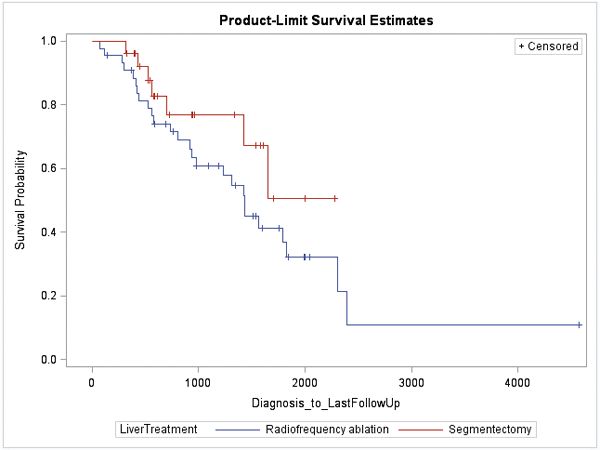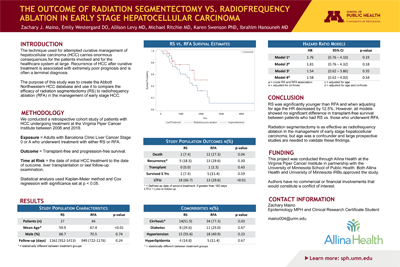Zachary Maino
MPH, Epidemiology
Co-Authors:
Emily Westergard, Michael Ritchie, Karen Swenson, Ibrahim Hanouneh
Advisor:
Dr. Ryan Demmer
Educational Objectives:
Evaluate the success of competing liver cancer treatments.
Keywords:
Liver cancer, Cancer treatment
Abstract
Purpose: To compare the efficacy of radiation segmentectomy (RS) to radiofrequency ablation (RFA) in the management of early stage hepatocellular carcinoma (HCC).
Methods: We conducted a retrospective cohort study of patients with HCC undergoing treatment at a large medical center in the United States between 2006 and 2018. Patients with Barcelona Clinic Liver Cancer (BCLC) Stage 0 or A who underwent treatment with either RFA or RS were included. Outcomes analyzed were transplant-free and progression-free survival. Time at risk was determined from the date of HCC treatment to the date of outcome, liver transplantation or last follow-up examination. Kaplan-Meier method and Wilcoxon rank sum tests were used. Data were presented as median (25th, 75th percentiles) or frequency (percent) with 95% confidence interval (CI), with significance set at p < 0.05.
Results: A total of 71 patients were included in the analysis, of whom 27 underwent RS and 44 patients had RFA. Patient were followed over a median period of 2.96 years. Mean age 64.5 + 10.6 with 69% males. There was no significant difference in transplant-free survival between patients who had RS vs. those who underwent RFA [1371 (95% CI: 1156, 1672) days vs. 1414 (95% CI: 1153, 1588) days respectively, (p=0.18)], Figure.
Conclusion: Our data indicates that RS is as effective as RFA in the management of early stage HCC. Large prospective studies are needed to validate those findings.


View Poster (PDF)
